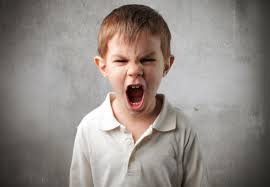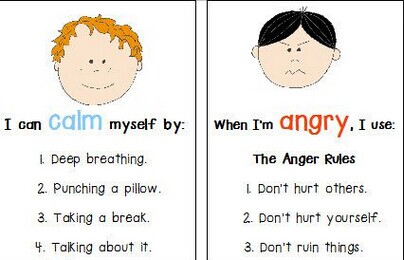 A signal emotion, anger has a tendency to mobilize a response to danger, and can also be a form of self-expression. For a child, it is at times a declaration of independence. A lot of things can trigger anger from a child, and aggression can sometimes be the result of this. As children reach school age, their parents could expect to see more subtle kinds of aggression such as sulking, pouting, and whining. Anger management’s goal is to lessen any feelings that are negative. This can help in lowering the negative physiological changes which are the result of anger. Here are some effective strategies for anger management for children.
A signal emotion, anger has a tendency to mobilize a response to danger, and can also be a form of self-expression. For a child, it is at times a declaration of independence. A lot of things can trigger anger from a child, and aggression can sometimes be the result of this. As children reach school age, their parents could expect to see more subtle kinds of aggression such as sulking, pouting, and whining. Anger management’s goal is to lessen any feelings that are negative. This can help in lowering the negative physiological changes which are the result of anger. Here are some effective strategies for anger management for children.
Effective Anger Management for Children
Being a normal human emotion, anger is not uncommon. However, when it is uncontrolled, it may lead to aggressive behavior. This can then lead to problems of physiological nature and even behavior that is harmful. The toddler years are where you can first see aggression begin. This is a time when children are naturally more aggressive than other age groups. It is thought that one reason aggression may start at this age is due to a toddler’s inability to talk. Young children and toddlers have to learn how their emotions can be controlled. If it is not, over time frequent aggression can cause the child problems at home, in school, and with their family and friends. A child can find better ways to cope with their angry feelings with anger management.
1. Identify and Control Feelings
Instruct children on feelings so they can learn to vocalize their feelings of frustration, disappointment and anger. Feelings like sadness and being hurt are often covered up by aggressive behavior. Show your child how they can identify and speak about their feelings rather than acting out on them.
Explain to them as well that feeling angry is alright and that sometimes it is appropriate to feel this way. This can help kids understand the feeling and that talking about them is not a bad thing to do.
2. Set a Good Example for Your Children
To teach your children how to control their anger it is essential that you are a good role model. They will be a lot more likely to have trouble controlling their anger or understanding what is and isn’t appropriate if they see you lose your cool. Some parents will hide their frustrations from the children, however it is also good that they see how you handle you angry feelings successfully. Take opportunities to talk with them about their feelings and the right ways to deal with them.
3. Create Anger Management Rules
A lot of families have unofficial rules about what behavior is acceptable and what isn’t when it comes to anger. Some don’t mind raised voices or slammed doors, while some have less tolerance for these types of behaviors. Clearly write out your household rules so kids understand what they can and can’t do when they are feeling angry, and what kind of behavior will result in a consequence.
These rules should be focused on respectful behavior towards others. Kids have to learn that just because they are feeling angry that it isn’t ok to hurt someone.
4. Teach Proper Ways of Managing Anger
Children also need to know the right ways to deal with anger. For instance when a time-out is used as discipline instead of punishment, they learn to take a break on their own to calm down. Kids will also benefit from learning coping skills. Instruct them about taking a break when they are frustrated, and show them how to relax by doing something they enjoy. Teach them problem-solving skills and how to resolve conflict peacefully. Below are some beneficial ways of handling anger:
- Write letters (if old enough). Even if they are not delivered, writing letters is an effective way of processing feelings. This is a strategy which can be helpful if they have little or no contact with the recipient. By putting how they really feel on paper, it gives them a tangible way of dealing with their feelings so they won’t be ignored and bottled up. Even younger children can make photo journals and letters, or they can speak what they are thinking out loud and have an adult write them out.
- Exercise regularly. Ensure your child is getting plenty of exercise. If this is difficult, think about walking or jogging with them several times each week. This will also give a chance for you to bond, and also to sort out any emotions. This can also help you both to handle stress better, get better sleep and give you more energy for getting through the day.
- Distract anger. Give your child some acceptable ways of blowing off steam, like running around the house or up the street, screaming into a pillow, tensing and releasing their muscles or using a punching bag. This might seem like simplistic strategies, but it is important to not think your kid’s anger will go away on its own. Children need to be instructed on how to effectively relieve tension while they are feeling angry.
- Talk to someone he trusts. Sometimes, this is the most effective strategy. A child can feel like he can’t talk to anyone at times when he is angry. Therefore, having someone he knows he can trust, even other than a parent, is a good idea for when frustration arises.
5. Stay Calm
If you are stressed, your child will be too, as they are barometers for the emotional climate that is around them. Therefore, you should schedule in relax time for yourself regularly. If you have a chance to recuperate once in a while, it’ll be far easier to respond to the meltdowns of your child in a calm manner. These calm responses can help contain the anger of your child while angry ones will make your child even more upset.
Remember that time-outs for adults are useful as well. Ensure that your child is safe and take yourself away from the situation. Breathe slowly and deeply and tell yourself to keep calm. If your child hears you yelling abusive words at a driver, don’t be shocked when you hear a bunch of insults coming from their mouth when their sister has done something to upset them.
6. Some Games and Activities for Handling Anger
Sometimes, games are a great way to diffuse your child’s anger and help them to work through it. It can be a fun way to process how they are feeling and to let off some steam.
- Toss Away Anger. You’ll need to gather up some markers, napkins or toilet tissue, large white paper, tape and a container of water. Tape the paper up somewhere, preferably outside. Each participant needs to write down things or people who make them angry, or they can draw pictures if younger. Dip the napkins in the water and throw them at the white paper – the wetter they are the better they’ll stick. The mark will begin to drip down and the words or drawings will fade, giving you the opportunity to talk about how it felt to throw things at “their angry thoughts or feelings” and how they feel afterwards.
- Make your child a calm down box. These boxes are the perfect way to encourage your child to calm down when they are having a tantrum, anytime they are feeling frustrated, sad or angry, or even while waiting for something, like lunch. All the things placed in the box should represent a means of managing emotions that is acceptable and positive. The boxes could contain items which appeal to the senses – ones that smell, touch, look good, and are pleasing to hear as well. Things to include could be items such as a glitter bottle, rice bin, play dough, squeeze toys, and a soft pillow and blanket. Other things that are helpful are calming music, sensory balls, coloring materials, Rubix cube, bubbles, pinwheels and books.
- The help of power cards. Oftentimes power cards are used by autistic children, however they can be used and are helpful for any child. They are very visual cards that have short bulbs and lists of information which helps a child in different situations that he might run across. They can look at the ones related to anger when they are angry or before a difficult task. Or, you might have the child review the cards on calming down.

When to See Medical Assistance
If the above anger management for children doesn’t work and you think that your child’s anger is very out of control and affect the way he interacts with friends and family, consult your doctor. You can be referred to a psychologist or another licensed mental health professional by your family doctor. They will work with your family and your child and can help come up with ways to change your child’s responses and thinking. This can better his behavior overall and better his relationships.
